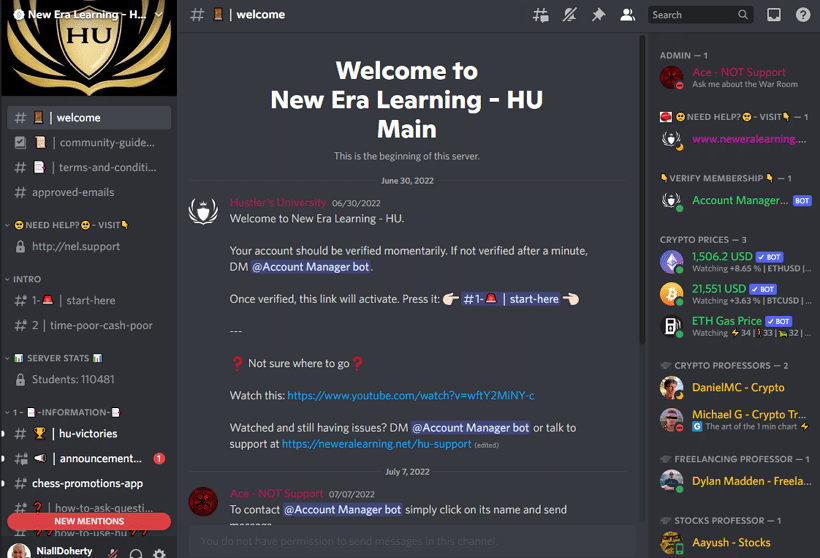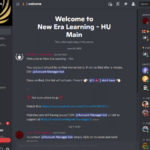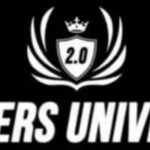Free Hustlers University Course, a controversial offering in the realm of online education, has sparked debates about the nature of learning, the value of “free” content, and the impact of influencer culture. This course, spearheaded by Andrew Tate, promises to unlock the secrets to entrepreneurial success through a blend of self-improvement, business strategies, and a “hustle” mentality. But behind the allure of quick wealth and personal transformation lies a complex web of ethical considerations, potential biases, and the ever-present question of whether “free” education can truly deliver on its promises.
The course’s curriculum delves into a range of topics, from the rise of free online education and the role of social media to the ethical implications of monetizing educational content and the intersection of education and business. It encourages students to embrace personal responsibility, develop entrepreneurial skills, and navigate the competitive world of online learning. However, critics argue that the course’s methods and content may be overly simplistic, potentially promoting unrealistic expectations and potentially harmful “hustle” tactics.
The Rise of Free Online Education
The world of education is undergoing a dramatic transformation, with free online courses emerging as a powerful force. These courses, readily accessible through platforms like Coursera, edX, and Khan Academy, are revolutionizing the way people learn and impacting traditional educational systems in profound ways.
The Growing Popularity of Free Online Courses, Free hustlers university course
Free online courses have gained immense popularity due to their flexibility, affordability, and accessibility. The convenience of learning at one’s own pace and from anywhere in the world has made them particularly attractive to individuals seeking to enhance their skills, explore new subjects, or pursue professional development. This growing trend has led to a significant increase in the number of learners enrolling in free online courses, indicating a shift in how people approach education.
Advantages and Disadvantages of Free Online Courses
Free online courses offer a unique set of advantages and disadvantages compared to traditional university courses.
Advantages of Free Online Courses
- Flexibility and Accessibility: Free online courses allow learners to study at their own pace and from any location with an internet connection, making them ideal for busy individuals or those with geographical constraints.
- Affordability: The cost-free nature of these courses eliminates financial barriers to education, making learning accessible to a wider range of individuals.
- Variety of Subjects: Free online platforms offer a vast array of courses across diverse disciplines, catering to a wide range of interests and learning goals.
- Global Reach: Free online courses transcend geographical boundaries, connecting learners from around the world and fostering a global learning community.
Disadvantages of Free Online Courses
- Lack of Interaction: Free online courses may lack the face-to-face interaction and personalized feedback found in traditional classrooms, potentially hindering student engagement and motivation.
- Limited Credibility: While some free online courses are offered by reputable institutions, others may lack the same level of rigor and quality control as traditional university courses, raising concerns about their credibility and value.
- Self-Discipline: Free online courses require a high level of self-discipline and motivation, as learners are responsible for their own learning progress and time management.
Examples of Successful Free Online Courses
Several free online courses have achieved remarkable success, impacting the lives of countless students.
The Impact of Khan Academy
Khan Academy, a non-profit organization offering free online courses in various subjects, has played a significant role in democratizing education. Their engaging videos and interactive exercises have made learning accessible to millions of students worldwide, particularly those in underserved communities.
The Success of Coursera
Coursera, a platform offering both free and paid online courses from leading universities and institutions, has become a global phenomenon. Their courses, often taught by renowned professors, provide learners with access to high-quality education at an affordable price.
The Rise of MOOCs
Massive Open Online Courses (MOOCs) have gained immense popularity, offering free online courses to a vast audience. Platforms like edX and Udacity have made significant contributions to the MOOC movement, providing learners with access to cutting-edge knowledge and skills development opportunities.
Hustlers University: Free Hustlers University Course

Hustlers University (HU) is a controversial online program founded by Andrew Tate, a former kickboxer and internet personality. The program claims to teach its members how to “hustle” and become successful in various fields, including business, marketing, and cryptocurrency.
Origins and Goals of Hustlers University
HU was launched in 2021 and quickly gained popularity, particularly among young men. Tate, a self-proclaimed “self-made millionaire,” positions himself as a mentor and guide for aspiring entrepreneurs and hustlers. He promotes the idea of “alpha male” behavior, emphasizing self-reliance, assertiveness, and a relentless pursuit of success. HU’s primary goal is to provide its members with the tools and knowledge they need to achieve financial freedom and personal growth.
Content and Format of Hustlers University Courses
HU offers a wide range of courses covering topics such as:
- Business and Marketing: Courses cover digital marketing, social media strategies, online business models, and building a personal brand.
- Finance and Investing: Courses delve into topics like cryptocurrency trading, stock market investing, and wealth management.
- Lifestyle and Mindset: Courses focus on personal development, building confidence, overcoming procrastination, and adopting a “hustler” mindset.
- Dating and Relationships: Courses offer advice on attracting partners, building strong relationships, and navigating the dating scene.
The courses are delivered through a combination of video lessons, audio recordings, and downloadable materials. HU also features a community forum where members can interact with each other and ask questions.
Controversy Surrounding Hustlers University
HU has been criticized for its controversial teachings, which have been accused of promoting misogyny, toxic masculinity, and predatory business practices. Tate’s rhetoric, often characterized by aggressive and misogynistic language, has sparked widespread condemnation.
- Misogyny and Toxic Masculinity: Critics argue that HU’s teachings perpetuate harmful stereotypes about women and promote a culture of dominance and aggression among men.
- Predatory Business Practices: Some have accused HU of using manipulative tactics to recruit members and selling them on unrealistic promises of wealth and success.
- Lack of Transparency and Accountability: HU has been criticized for its lack of transparency regarding its curriculum, instructors, and financial model. There have also been concerns about the program’s effectiveness and the potential for scams.
Despite the controversy, HU continues to attract a large following, particularly among young men seeking quick wealth and success. The program’s success raises important questions about the role of online education in shaping values and promoting ethical behavior.
The Value of “Free” Education

The concept of “free” education, especially in the online realm, has become increasingly prevalent. While the term “free” might conjure up images of readily available, high-quality learning experiences, the reality is more nuanced. Free online courses, while accessible, come with their own set of benefits and drawbacks, and understanding these is crucial for navigating the vast landscape of online learning.
The Benefits of Free Online Courses
Free online courses offer a plethora of advantages, particularly in terms of accessibility and flexibility. They remove traditional barriers to education, such as cost and location, opening up learning opportunities to a wider audience.
- Increased Accessibility: Free online courses eliminate financial barriers, allowing individuals from diverse socioeconomic backgrounds to access knowledge. This democratizes education, empowering those who might not have had the means to pursue traditional learning paths.
- Flexibility and Convenience: Free online courses provide a flexible learning environment, allowing individuals to learn at their own pace and on their own schedule. This is particularly beneficial for working professionals, parents, or individuals with busy schedules.
- Global Reach: Free online courses transcend geographical boundaries, connecting learners from across the globe. This fosters cross-cultural understanding and collaboration, promoting a more interconnected learning community.
The Drawbacks of Free Online Courses
While free online courses offer undeniable benefits, they also come with potential drawbacks, particularly in terms of quality and the potential for exploitation.
- Quality Concerns: The free nature of online courses can sometimes lead to quality issues. Without the rigorous standards and oversight often associated with traditional institutions, the content and instruction can vary widely in quality.
- Lack of Accreditation: Many free online courses are not accredited, meaning they may not be recognized by employers or educational institutions. This can limit their value for career advancement or further academic pursuits.
- Potential for Exploitation: The “free” model can sometimes be used to exploit learners. Some platforms may use free courses as a way to gather personal data or promote other paid services. It’s crucial to be aware of the potential for exploitation and to choose reputable providers.
Ethical Considerations Surrounding Monetization
The monetization of free online courses raises ethical considerations. While platforms need to generate revenue to sustain their operations, it’s important to ensure that this monetization does not compromise the integrity of the educational content or exploit learners.
- Transparency and Disclosure: Platforms should be transparent about their monetization strategies, clearly disclosing how they generate revenue. This helps learners make informed decisions about the courses they choose.
- Prioritizing Educational Value: The primary focus should be on providing high-quality educational content, not on maximizing profits. Monetization strategies should not detract from the core mission of education.
- Fair and Equitable Access: Monetization models should ensure that access to quality education remains equitable, regardless of socioeconomic background. This can be achieved through scholarships, financial aid programs, or other mechanisms that reduce barriers to learning.
The Role of Entrepreneurship and “Hustle”
Hustlers University positions itself as a platform for aspiring entrepreneurs, emphasizing the importance of “hustle” in achieving financial success. Understanding the core concepts of entrepreneurship and the specific “hustle” approach promoted by Hustlers University is crucial for evaluating its claims and potential value.
Defining Entrepreneurship and “Hustle”
Entrepreneurship, in its essence, is the process of creating and running a new business, taking on the risks and rewards associated with it. This involves identifying opportunities, developing innovative solutions, and building a sustainable business model. “Hustle,” in the context of Hustlers University, refers to a relentless pursuit of success, characterized by hard work, dedication, and a willingness to go the extra mile. This involves actively seeking out opportunities, overcoming obstacles, and constantly striving to improve.
Methods and Strategies for Entrepreneurial Success
Hustlers University claims to teach methods and strategies for achieving entrepreneurial success through its various courses and programs. These strategies typically focus on leveraging digital platforms, online marketing, and e-commerce to build and scale businesses. Examples of these strategies include:
- Affiliate Marketing: Promoting other businesses’ products or services in exchange for a commission on sales generated through your referral.
- Dropshipping: Selling products online without holding inventory, relying on third-party suppliers to fulfill orders directly to customers.
- E-commerce: Building and running an online store to sell products directly to consumers.
- Social Media Marketing: Utilizing social media platforms to build brand awareness, engage with customers, and drive sales.
Risks and Rewards of the “Hustle” Culture
The “hustle” culture promoted by Hustlers University can be both empowering and potentially detrimental.
Potential Rewards
- Financial Freedom: The potential to achieve financial independence and control over one’s income.
- Personal Growth: The opportunity to develop new skills, build resilience, and gain valuable experience.
- Flexibility and Autonomy: The ability to work on one’s own terms, setting one’s own hours and having control over one’s work environment.
Potential Risks
- Burnout: The relentless pursuit of success can lead to exhaustion, stress, and burnout, impacting physical and mental well-being.
- Financial Instability: The entrepreneurial journey can be unpredictable, with the risk of financial setbacks and losses.
- Lack of Work-Life Balance: The “hustle” culture can lead to an imbalance between work and personal life, impacting relationships and overall well-being.
The Impact of Social Media and Influencer Culture
Social media has become an indispensable tool for promoting and disseminating information in the digital age. Its reach and influence have transformed how businesses market their products and services, and educational platforms are no exception. Hustlers University, a controversial online program that promises to teach “hustle” and entrepreneurship, has leveraged social media effectively to gain traction and attract a large following. This section explores the role of social media in promoting Hustlers University and its teachings, analyzes the influence of key figures like Andrew Tate, and examines the ethical implications of using social media to promote potentially controversial content.
The Role of Social Media in Promoting Hustlers University
Social media platforms like Instagram, TikTok, and YouTube have been instrumental in promoting Hustlers University and its teachings. The program’s marketing strategy relies heavily on influencer marketing and engaging content that resonates with its target audience. The use of visually appealing videos, motivational quotes, and testimonials from purportedly successful “students” has helped to create a sense of community and build trust among potential participants. The program’s social media presence has been particularly successful in reaching young adults who are seeking to achieve financial independence and personal growth.
The Influence of Andrew Tate and Other Influencers
Andrew Tate, a controversial figure known for his outspoken views and self-proclaimed success in business and entrepreneurship, has played a significant role in promoting Hustlers University. Tate’s large following on social media, particularly among young men, has helped to amplify the program’s reach and attract new subscribers. Other influencers, including former professional athletes and social media personalities, have also endorsed Hustlers University, further contributing to its growing popularity.
Ethical Implications of Promoting Controversial Content
The use of social media to promote potentially controversial content, such as the teachings of Hustlers University, raises ethical concerns. Some critics argue that the program’s focus on “hustle” and “alpha male” ideology promotes toxic masculinity and harmful stereotypes. They also express concerns about the potential for financial exploitation and the lack of accountability for the program’s claims. The use of social media to target vulnerable individuals, particularly young people, with potentially misleading or harmful content is a growing concern that requires careful consideration.
The Future of Free Online Education
The rise of free online education has disrupted traditional learning models, making knowledge more accessible and affordable than ever before. This trend is expected to continue, transforming the educational landscape in profound ways.
The Evolution of Free Online Education
The future of free online education is characterized by ongoing innovation and expansion. Platforms like Hustlers University are playing a crucial role in shaping this evolution, demonstrating the potential of free online learning to empower individuals and democratize knowledge.
- Personalized Learning Paths: Free online platforms are increasingly offering personalized learning paths tailored to individual needs and goals. This allows learners to focus on specific areas of interest and acquire skills relevant to their career aspirations.
- Interactive and Engaging Content: Free online education is embracing interactive learning experiences, incorporating gamification, simulations, and virtual reality to enhance engagement and knowledge retention.
- Micro-Learning and Bite-Sized Content: Free online platforms are offering micro-learning modules and bite-sized content, making it easier for learners to acquire knowledge in short bursts of time, fitting into busy schedules.
The Role of Platforms like Hustlers University
Platforms like Hustlers University are leading the charge in free online education, offering a unique blend of practical skills, mentorship, and community support. Their impact is multifaceted, contributing to the growth and evolution of free online learning.
- Breaking Down Barriers to Education: Platforms like Hustlers University remove financial barriers to education, making high-quality learning accessible to a wider audience.
- Fostering a Community of Learners: These platforms create vibrant communities where learners can connect, collaborate, and support each other, fostering a sense of belonging and shared learning.
- Democratizing Knowledge and Skills: Platforms like Hustlers University are democratizing access to valuable skills and knowledge, empowering individuals to pursue their passions and build successful careers.
Challenges and Opportunities
The free online education landscape faces both challenges and opportunities. Navigating these complexities will be crucial for its continued growth and impact.
- Quality Control and Accreditation: Ensuring the quality and credibility of free online education is a significant challenge. Platforms need to establish robust quality control mechanisms and work towards accreditation to build trust and legitimacy.
- Funding and Sustainability: Free online education platforms rely on various funding models, including donations, subscriptions, and partnerships. Maintaining financial sustainability while ensuring accessibility is a crucial balancing act.
- Addressing Equity and Access: Ensuring equitable access to free online education for all individuals, regardless of their background or location, is a critical goal. Platforms need to address digital divides and provide support for learners with diverse needs.
The Role of Personal Responsibility and Self-Improvement
In the realm of free online education, particularly in the context of Hustlers University, the emphasis on personal responsibility and self-improvement is paramount. This concept underscores the notion that while access to knowledge is readily available, the responsibility for utilizing it effectively lies with the individual.
Hustlers University’s Emphasis on Personal Responsibility
Hustlers University stands out by explicitly promoting the idea that success is not solely dependent on external factors but rather on the individual’s commitment to personal growth and continuous learning. This approach contrasts with traditional educational models that often place greater emphasis on structured learning environments and external validation.
- Focus on Action: Hustlers University emphasizes taking action and applying knowledge rather than passively consuming information. Students are encouraged to experiment, fail, and learn from their experiences, fostering a proactive mindset.
- Self-Directed Learning: The platform provides a framework for self-directed learning, empowering individuals to identify their areas of interest and pursue them at their own pace. This fosters a sense of ownership and responsibility for one’s learning journey.
- Community Support: Hustlers University fosters a community where members can support and motivate each other, sharing experiences and insights. This collaborative environment promotes a sense of accountability and encourages personal growth.
The Intersection of Education and Business
Hustlers University, with its emphasis on practical skills and real-world applications, embodies the convergence of education and business. This approach challenges traditional educational models and highlights the growing demand for knowledge that directly translates to tangible results in the business world.
Bridging the Gap Between Education and Business
The traditional education system often struggles to keep pace with the rapid evolution of business needs. Universities, with their focus on theoretical knowledge, may not always equip graduates with the practical skills and agility required in today’s dynamic business landscape. This gap between education and business is where online platforms like Hustlers University come into play. They offer a unique opportunity to bridge this divide by providing access to relevant, actionable knowledge, and mentorship from experienced professionals in various fields.
The Ethics of Commercializing Educational Content
The commercialization of educational content raises ethical concerns. While online platforms like Hustlers University provide accessible and affordable learning opportunities, there is a need to ensure that the pursuit of profit does not compromise the integrity and quality of the educational content. Transparency, clear communication of value propositions, and ethical considerations are crucial in navigating this complex landscape.
The Free Hustlers University Course, a controversial offering in the realm of online education, challenges traditional learning models and raises questions about the role of influencers, the value of “free” content, and the ethics of monetizing educational materials. While the course’s focus on personal responsibility and entrepreneurial success may resonate with some, its methods and content have sparked debates about the potential for harm and the need for critical analysis. Ultimately, the course’s impact and legacy will be determined by the choices of its students and the broader societal discourse surrounding online education and “hustle” culture.
Free Hustlers University offers valuable insights on entrepreneurship and financial literacy, and while it’s a great starting point, you might find it helpful to consult a financial advisor for more personalized guidance. If you’re a teacher looking for financial advice tailored to your needs, consider finding a financial advisor for teachers near me. This can help you navigate your finances, plan for retirement, and make informed decisions about your money.
The skills and knowledge gained from Free Hustlers University, combined with professional financial advice, can empower you to achieve your financial goals.
Free Hustlers University courses offer a wealth of knowledge on various business and entrepreneurial skills. While these courses can provide valuable insights, it’s also crucial to consider your long-term financial planning, especially for retirement. If you’re looking for guidance in this area, consider reaching out to financial retirement advisors near me. Their expertise can help you build a solid financial foundation, ensuring you’re on track for a comfortable and secure retirement, allowing you to focus on your entrepreneurial endeavors with peace of mind.
While there might be some free Hustlers University courses available, it’s important to be aware of the potential downsides. You can find a lot of discussion about the program and its legitimacy on hustlers university reddit. Before committing to any paid courses, it’s worth exploring the free options and understanding the overall context of the Hustlers University program.







